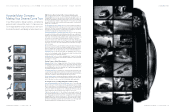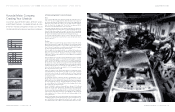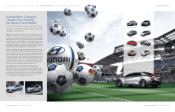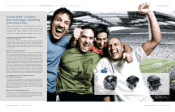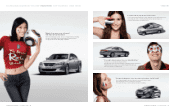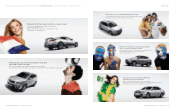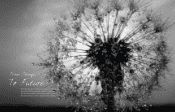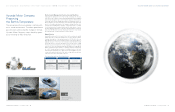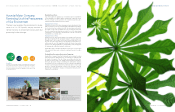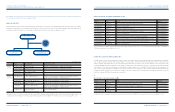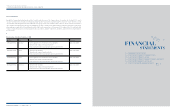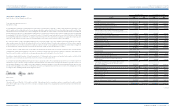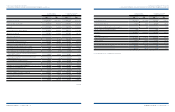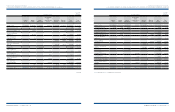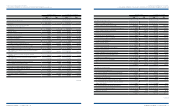Hyundai 2009 Annual Report Download - page 26
Download and view the complete annual report
Please find page 26 of the 2009 Hyundai annual report below. You can navigate through the pages in the report by either clicking on the pages listed below, or by using the keyword search tool below to find specific information within the annual report.
Pollution-Free Hydrogen Fuel Cell Electric Vehicles
Hydrogen fuel cell electric vehicles use hydrogen as their power source, which
reacts with the oxygen in the air to give energy. They are anticipated to be the
ultimate pollution-free car as they discharge nothing but water vapors as exhaust.
Hydrogen can be produced with different energy sources such as solar heat, wind
power, and nuclear energy, and thereby can help reduce our existing dependency
on fossil fuels. Furthermore, it is the most efficient way to use natural energy
sources, because the technology is twice as efficient compared to conventional
internal combustion engines.
Hyundai has continued to invest in R&D to secure both product and price competi-
tiveness for hydrogen fuel cell electric vehicles. It successfully achieved low tem-
perature ignition at -20°C, and also reduced the cost of the fuel cell stack by a sixth
through a technology that produces the cells by stamping thin metallic sheets,
a positive indication of its potential for mass production. At the same time, Hyundai
continues to carry out crash, mock fire, and other tests to verify and evaluate safety.
As a leading global automaker, Hyundai Motor Company is passionate about envi-
ronment protection and firm in its conviction about the need for eco-friendly cars.
It will complete test fleets needed for commercializing hydrogen fuel cell electric
vehicles in Korea and the US by 2010, and start producing them in small quantities
in 2012.
Road Map for Developing Hydrogen Fuel Cell Electric Vehicles
2000
Participation in a California fuel cell partnership project (Santa Fe fuell cell electric vehicle)
2003
Independent development of a fuel cell hybrid vehicle
2006
Independent development of a fuel cell electric bus
2004~2010
Operation of a test fleet with the US Department of Energy
(Tucson fuel cell electric vehicle)
2006~2010
Start of monitoring project in the Korean domestic market;
Actual application of independently-developed fuel cell electric architecture
2009~2013
Delivery of pilot fleets
2012
Production in small quantity
1st Stage (~2006)
Research of base technology
2nd Stage (2007~2009)
Development of prototypes
3rd Stage (2009~2012)
Production in small quantity
and early commercialization
>>
REACTION TO WEATHER CHANGES & ECO TECHNOLOGY DEVELOPMENT
It might not be just a dream to make a car that
actually protects and nurtures the environment.
At Hyundai, we continuously look for new ways
to make it real.
Hyundai Motor Company,
Developing Cars Welcomed
by Nature
01
02
03
1. Tucson hydrogen fuel cell electric vehicle
2. Ceremony commemorating the delivery of hydrogen fuel cell
electric vehicles
3. Trial of a hydrogen fuel cell electric vehicle in the US
HYUNDAI MOTOR COMPANY I 2009 ANNUAL REPORT I 51HYUNDAI MOTOR COMPANY I 2009 ANNUAL REPORT I 50
INTRO I FINANCIAL HIGHLIGHTS I MESSAGE FROM THE CEO I TO TRUTH I TO POWER I HYUNDAI WITH THE WORLD I TO FUTURE I HYUNDAI WITH HONESTY I SUPPLEMENT I FROM HYUNDAI


